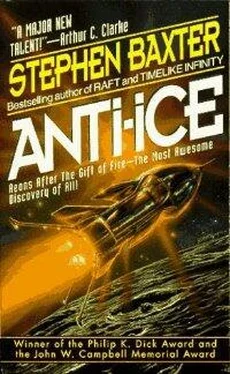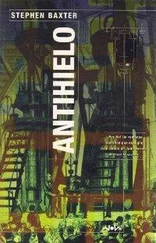“Ned, my mind is made up. Let us go seek your precious lady; let us make for Paris, the Queen of Cities!”
I searched his face again. There was no sign of guile or deception; in fact I was reminded of the impulsive enthusiasm I had reawakened in him in those last minutes of our approach to the Moon. And so, at length, I nodded.
Traveller clapped his hands together. “I have told Pocket to shelter within the house, and so we are all prepared to leave. Now then, Ned, if you would vacate my chair—release those levers as slowly as you are able—”
And so, within a few minutes, the noise of the rockets rose to a roar; the covering tarpaulins ripped and fell away, and the Phaeton soared high over the Surrey countryside.
* * *
Traveller, with skill and grace, flew at a height of about half a mile above the land. He tilted the engines, explaining that by doing so the rockets could not only support the weight of the craft in the air, but also impart a significant sideways acceleration.
And so we sped southwards.
I stood with my face pressed to the windows. At such a height the land, when not obscured by clouds, takes on the appearance of a toy layout featuring beautifully detailed houses, trees and glistening rivers. It was something of a shock when we abruptly sailed over the gunmetal-gray waters of the Channel.
After perhaps an hour we reached the French coast. A harbor town lay spread out like a diagram below us, and Traveller compared the view through his periscope with the contents of a map spread over his chest. At last he nodded in satisfaction. “We have reached Le Havre. Now it is but a short hop to Paris herself!”
I imagined the simple fisherfolk below peering up and wondering at the screaming, fire-belching monster which streaked across their sky.
Our guide now was the Seine; we followed its silver course upstream through Normandy. Smoke spiraled from scattered cottages and farmhouses and, under the influence of the prevailing winds, streamed like feathers to the east. From this godlike perspective there was no sign of the war.
At one point we sailed high over Rouen—the old streets looked like a child’s maze—and I recalled that it was here that we English had burned to death the Maid of Orléans. I wondered what that brave warrior would have made of our great aluminum air-boat. Would she have thought it one more vision of the Lord?
At last, at about two in the afternoon, we reached the outskirts of Paris herself.
From the air Paris is a rough oval through which the Seine cuts neatly from east to west. With the periscope we could quite clearly see the islands which lie at the heart of the city, and we studied the elegant roof of the Cathedral of Notre Dame—untouched as yet by the Prussian artillery which had been brought into close order around the city. Just to the north of the water, we could make out the Rue de Rivoli which runs parallel to the river. Tracing the road to its western extent I found the Champs Elysées, and I puzzled over fallen trees scattered over the roadway, looking like spilled matchstalks. I wondered if they had been felled by German artillery, but Traveller suggested that the grand avenue was being cut down in order to supply firewood for the city’s beleaguered citizens.
Around the brown-gray carcass of the city lay the main defensive fortifications: we tracked twenty miles of walls from the Bois de Boulogne in the west to the Bois de Vincennes in the east. And, in the countryside beyond the walls, we could clearly see the encampments of the besieging Prussian armies. Officers’ tents lay like scattered handkerchiefs among the woods and fields; and—when we descended a little lower—we could make out the pits in which artillery pieces had been lodged—hundreds of them, all with their sinister snouts trained on the hapless citizens of Paris. And we could even espy the flashing red, blue and silver uniforms of the Prussian soldiery themselves.
As I stared down at the wondering, upturned faces of these conquering Germans it occurred to me how simple it would be for me to drop, say, a Dewar-ful of anti-ice among them—with quite devastating effect. The Prussians could do nothing in response; we could easily rise above the range of their guns, even if they could be trained on an object floating in the air.
I shuddered, wondering if I had had a vision of some future war.
Now we were fascinated to see, rising from the brown mass of the city, the bulky, ponderous form of a hot air balloon. The Manchester newspapers had been full of the Parisians’ brave attempts to communicate with the rest of France by means of such vessels, and by the even more desperate expedient of carrier pigeons; but nevertheless the actual sight was quite startling. The clumsy vessel resembled a patchwork quilt in its jumble of colors and roughly-cut panels, and it bobbed uncertainly in the brisk westerly winds which soared over the roofs of the city, but off to the east it sailed with a semblance of grace, crossing the city walls in minutes.
We scanned the horizon with Traveller’s telescopes—but of the Prince Albert there was no sign. Traveller frowned. “Well, Ned, what next?”
I shook my head, baffled and disappointed; the scale of the martial drama laid out below me was so great that my impulsive dreams that one man could alter the course of unfolding events, even armed with such a tool as Phaeton, seemed foolish fantasies. “I don’t know what we can do here,” I said at length. “But I think I should still very much like to find Françoise.”
Traveller pulled at his chin. “Then we must gather more information as to the Albert’s whereabouts.”
“Should we land in the city itself?”
He studied the maps on his chest for a few moments. “I am reluctant to follow such a course. We would have no way of warning the citizens of our approach, or of ensuring the area was made clear—indeed, in the Parisians’ present excitable state, our imminent landing might attract large crowds, who would rush into the path of our steam jets.
“No, Ned; I can’t recommend a landing in the city. But I have an alternative suggestion.”
“Which is?”
“Let us follow that balloon pilot. When he comes down we can land in safety and approach him.”
I thought this over. I felt reluctant to waste hours in gentle pursuit of the primitive craft. But on the other hand the balloon’s pilot would surely have a wider understanding of the situation than the average Parisian, for otherwise he would not have been assisted to escape. A few moments quizzing this intrepid fellow might replace hours of scouring the Parisian mobs.
“Very well,” I said to Traveller. “Let us pursue this brave pilot, and hope that he can assist us.”
* * *
To the east of Paris lies the Champagne region of France; and it was here, some twenty miles from the city walls, that the westerly winds deposited our balloon pilot. Amid neat little vineyards his deflated vessel lay like a colorful pool, quite unmistakable from the air.
Traveller landed the Phaeton a quarter of a mile to the north. Before the rocket nozzles had cooled we unraveled rope ladders and scrambled to the ground. It was now late afternoon and we stood for a few seconds, blinking up at a cloudy sky. The Phaeton, having arrived in its usual spectacular style, sat at the center of a disc of charred and fallen vines; never again would these plants bear fruit! And just beyond the burned region a young man in a simple smock stood staring; even from here I could see how his mouth hung open.
Traveller strode confidently toward this rustic and pressed money into his hands. The engineer told the fellow, in broken French, that he was to take this offering to his employer as recompense for the destruction of a portion of his vines. Bemused, the poor chap unfolded the money and stared at it, as if he had never seen an English five-pound note before. But we left no time for further explanations; with the curtest of farewells to our reluctant host we strode off through acres of hedgerow and vine.
Читать дальше












